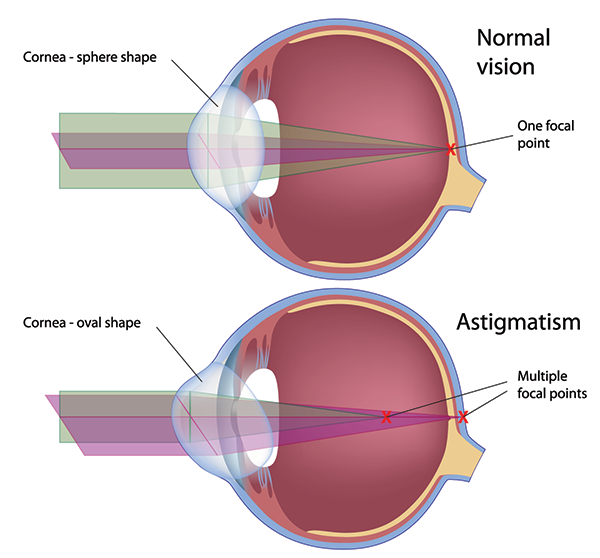Astigmatism Correction in Toms River
What Is Astigmatism?
Astigmatism is a common eye condition that's easily corrected by eyeglasses, contact lenses, or surgery. Astigmatism is characterized by an irregular curvature of the cornea. This is one type of refractive error. Astigmatism occurs in nearly everybody to some degree. For significant curvature, treatment is required.
A person's eye is naturally spherical in shape. Under normal circumstances, when light enters the eye, it refracts evenly, creating a clear view of the object. However, the eye of a person with astigmatism is shaped more like a football or the back of a spoon. For this person, when light enters the eye it is refracted more in one direction than the other, allowing only part of the object to be in focus at one time. Objects at any distance can appear blurry and wavy.
What Causes Astigmatism?
Astigmatism can be hereditary and is often present at birth. It can also result from pressure from the eyelids on the cornea, incorrect posture, or an increased use of the eyes for close work.
What Are the Symptoms of Astigmatism?
People with undetected astigmatism often experience headaches, fatigue, eyestrain, and blurred vision at all distances. While these symptoms may not necessarily be the result of astigmatism, you should schedule an eye exam if you are experiencing one or more symptoms.
How Are Astigmatisms Diagnosed?
Your optometrist can diagnose astigmatism with a thorough eye exam. Astigmatism may occur with other refractive errors such as myopia ( nearsightedness) and hyperopia ( farsightedness). Unfortunately, astigmatism often goes undetected in school-age children.
Because astigmatisms may increase slowly, you should visit your eye doctor whenever you notice significant changes in your vision.
How Are Astigmatisms Treated?
Almost all degrees of astigmatism can be corrected with properly prescribed eyeglasses or contact lenses. For a person with only a slight degree of astigmatism, corrective lenses may not be needed at all, as long as other conditions such as nearsightedness or farsightedness are not present. If the astigmatism is moderate to high, however, corrective lenses are probably needed.
- Corrective lenses (eyeglasses or contact lenses).
For astigmatism, special corrective lenses called toric lenses are prescribed. Toric lenses have greater light bending power in one direction than the other. After performing various tests, your eye doctor will determine the ideal toric lens prescription for your astigmatism. - Refractive surgery.
Another method for correcting astigmatism is by changing the shape of the cornea through refractive or laser eye surgery. While there is more than one type of refractive surgery, specific treatments are recommended on an individual basis.
Refractive surgeries require healthy eyes that are free from retinal problems, corneal scars, and any eye disease. As technology progresses, it is becoming more and more important that you explore all options and possibilities before deciding which refractive surgery and treatment is right for you.

Office Location:
Dr. Jack Schwartz, OD
Pleasant Plaza
1341 Route 9, Suite 10
Toms River, NJ 08755
(732) 649-1199
Office Hours:
| Monday: | 9:30am - 5:00pm |
| Tuesday: | 9:30am - 5:00pm |
| Wednesday: | 9:30am - 5:00pm |
| Thursday: | 9:30am - 5:00pm |
| Friday: | 9:30am - 5:00pm |
| Saturday: | By Appointment |
| Sunday: | Closed |
Additional Info
To request an appointment, you can call us or fill out our form and a member of our staff will be in touch with you.
Below are the Medical History and Privacy Policy forms you'll need to complete on your first visit. You can expedite matters by downloading these forms, completing them at home and handing them to our staff when you arrive for your initial visit to our office.
Patient History Form
HIPPA Form
In order to view or print these forms you will need Adobe Acrobat Reader installed. Click here to download it.



